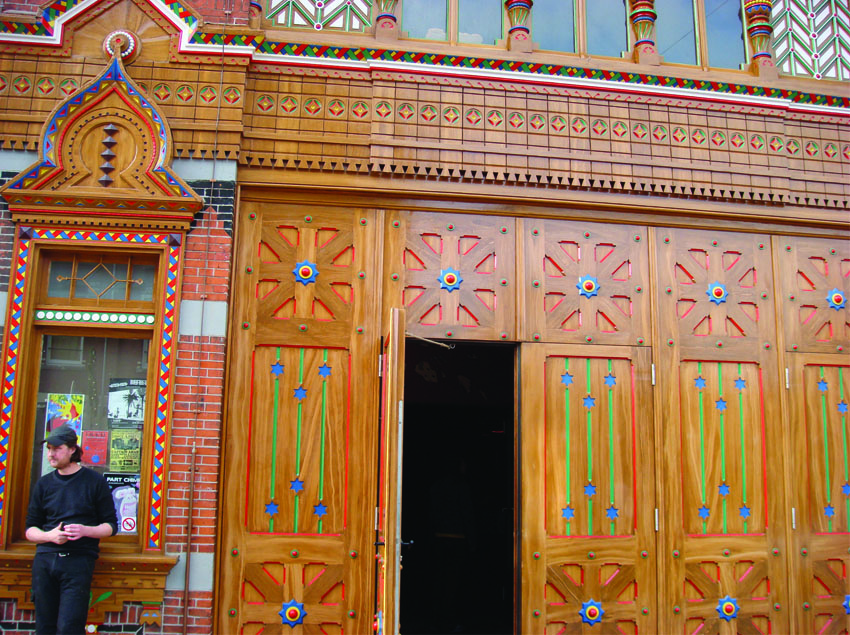Do It Yourself All Together: Rogier Smal and Sjoerd Stolk talk OCCII
In its 20-plus years of existence, OCCII has been run largely by volunteers, allowing the venue to offer a diverse program while remaining cheap to attend. The volunteers come and go, but for more than ten years, on any given day, chances are high that you’ll find Sjoerd Stolk and Rogier Smal at OCCII.Sjoerd behind the computer or mixing desk, and Rogier as a handyman repairing any one of the many things in need of his attention. They share their memories and thoughts on the place where they’ve come to spend so much of their time.
Even though OCCII has no centralised programming, since the early 2000s Sjoerd Stolk has been the embodiment of OCCII, sometimes literally. It’s been the case that bands would collect their instruments the night after a show at OCCII, and Sjoerd would still be there: cleaning or sleeping. For years he’s kept OCCII going, by ensuring a high-quality programme, running errands and taking on odd-jobs, with the help of a large pool of volunteers, who, apart from offering assistance, often need to be assisted themselves. It’s hard to get time to talk to Sjoerd, because he’s always hard at work. Rogier Smal, with whom Sjoerd works for the record label Toztizok Zoundz, and has organised countless shows, first heard of OCCII when he played there for the fist time in the mid-nineties. On a sunny spring day, the three of us take a walk outside to talk OCCII.
“I remember the first time I ever came here,” Rogier says, “I was 16 or 17, so it must have been ’95 or ’96, something like that. I’m from Stoutenburg, near Amersfoort, and it was a major thing for me that I was going to play a show in Amsterdam. I had pictured a venue where lots of tough punkers would go. And, of course, you want to be tough yourself when you’re 17 and you’re in a punk band. But when we arrived, there was this banner near the stage from De Kinderpret, the Wednesday’s children’s programme. And there was a dragon on it. It was a lot less tough than I’d imagined OCCII to be.”
Sjoerd recognises the same OCCII he knows in this story. This eclectic way of programming — from children’s activities to improv jazz to punk to DJ nights — is exactly what attracted him to the venue. “The first time I ever went to OCCII was probably in 2001. I came from the Kalenderpanden, a squat complex in Amsterdam where I often went to see shows. But the Kalenderpanden didn’t last long, and so some of the folks from there continued organising their events at OCCII. The first act I saw there was Shalabi Effect, a band from Canada. I liked the atmosphere right away, so I wanted to become a volunteer there.”
Already by that time, Sjoerd had experience with booking shows. It started back when he was still in high school. “From 1990, 1991, I was always in De Bakkerij, a youth centre in Castricum in the northwest of the Netherlands. We organised all kinds of stuff weekly. Just local things. Once a week we would sit around this crate filled with demos and cassettes, and listen to them. If we liked something, we invited the band to come and play a show in exchange for a crate of beer. At some point, De Bakkerij got its own PA and then we had to learn how to do sound. So I taught myself how to do it, with some help from others. In the end, you can do everything yourself.”
maths
At the end of the ‘90s, Sjoerd moved from Castricum to the Bijlmer to study to be a mathematics teacher. He had side jobs like being a merchandise seller, t-shirt printer, and stage hand at festivals, but also “shitty jobs” as a dishwasher. In the weekends, he kept organising shows at De Bakkerij, and also Parkhof, a venue in Alkmaar. “The reason why I clicked with OCCII right away,” Sjoerd says, “is that it had the same atmosphere that I knew from De Bakkerij and Parkhof. When somebody, basically anybody, has a good idea, it’s possible to do it at OCCII. Also, there aren’t many organisational layers. When I started as a volunteer at OCCII, it was kind of a mess, but the way we worked together felt natural. That’s always been most important to me: that things happen more or less naturally.” When in 2005 there was one open position for a coordinator, Sjoerd got the job. “I had enough of the shitty jobs I’d been doing till then,” he says, “and this was the kind of stuff I was doing most of the time anyway.”
Rogier moved to Amsterdam in 2002 and got involved with OCCII as a volunteer. “That just happened. I played in punk bands, and every weekend there were shows that everybody went to. That way you got to know new people. Somebody who organised a show at OCCII would ask you ‘I’m throwing a punk show this weekend, do you feel like cooking for the bands?’ It went without saying that if you played punk shows, you also helped organise them for other bands. We had our own ways of communication. Or rather: we didn’t have them, but we saw each other all the time anyway.”
These days, the volunteers at OCCII are much more diverse, Rogier thinks. “People don’t come to OCCII as groups of friends, but separately. For example, somebody from Chicago moves to Amsterdam for work or studies, and then thinks ‘This is a nice place, and I used to organise shows in my city too, so helping out at OCCII might be a way to get to know people in Amsterdam.’ It’s a less natural way, because you need to train that person first, but it’s great too of course.”
duct tape
Working at an experimental place like OCCII, you never really know what’s going to happen, Sjoerd thinks: “One day they all embrace your venue, the next day nobody shows up. We’ve had very strange nights here. One time we were waiting for a bunch of Parisian bands that were very late because there was a rainstorm. It was pouring and pouring. Suddenly, a lot of people knocked on the door because they wanted to take shelter from the rain. Among them, there were a couple of journalists for the Amsterdam newspaper Het Parool — they were doing a tour in the Old South in Amsterdam. We had to run upstairs and climb on the roof, because the rain was literally coming down through the lights, and pattering on the bar. In the end, we managed to dry the mess and clean it up, and by then it was 9:30 and the musicians finally showed up, and we were supposed to open at 10. The first two hours nobody showed up, but then, after midnight, OCCII was packed with 300 very hip people and three bands that I thought nobody had ever heard of, but they turned out to be well known bands in the art and fashion scene in Paris. And an hour earlier we were emptying a rain gutter. Het Parool of course had this negative piece on us: OCCII, well that’s this place that is built with duct tape. They hadn’t stayed to see the show, of course.”
Sjoerd is glad that those contrasts still exist. “With OCCII, we want to be able to do different stuff every week. It’s part of the deal that on one day there are only a handful of people, and on another night, it’s packed. As far as I can remember, that has always been the case. When I came here in 2001, on one night there were four people, and on the next, two hundred. The fluctuation is steady. I still really dig the fact that OCCII hosts shows for the top 5 of Maximumrocknroll, but also for the top 5 of The Wire and Gonzo. It isn’t only one genre that plays here, but several. If you’re just going to make safe choices when you’re booking acts, that’s the end.”
Bandcamp
Just like everywhere in the arts, for OCCII too there’s a struggle to keep it running financially. Raising the price of entrance tickets isn’t an option: written into the founding statute from 1992 is OCCII’s intent to ‘adapt entrance costs and consumption prices to unaffluent visitors’. And though independence has also been built into the identity — the name OCCII, ‘Onafhankelijk [independent] Cultureel Centrum In It’, asserts its independent position — this aspect doesn’t apply anymore, financially, at least, since last year, when OCCII started receiving a subsidy from the town hall. Sjoerd doesn’t think that the subsidy affects OCCII contentwise, mostly it just enables them to continue putting together a good programme. “Many venues,” Sjoerd says, “have gotten into the ‘subsidy wringer’ twenty or thirty years ago, but OCCII has only started looking for possibilities a year ago.” It became necessary because acts have started to ask for more money. “That’s also a mentality that has changed, because more and more gigs are being organised via booking agencies. It can happen that Dutch bands will contact a Berlin booking agency to play a show in Amsterdam. They can just as easily contact me directly, why make it so complicated? If bands tell me “We need two, three hundred euros, because we only play ten shows on our tour,” then I think: why don’t you play twenty then? That apparently isn’t possible. But, as long as there’s a dialogue with the band itself, that’s OK with me. If it becomes too impersonal, and the bookers only say ‘You can listen to some of their music online on Bandcamp — now do you wanna book them?’ I don’t like that way of cooperating.”
“The weird thing,” Sjoerd continues, “is that many people want to do things by themselves. They don’t want to be dependent on the big guys, but in the end, they do it anyway. Many booking agencies think of themselves as very Do-It Yourself, but they don’t operate in that way. I often hear that volunteers have done something cool at OCCII, but then the larger labels or booking agencies take credit for it so they can appear more DIY. Then I think: why should there be somebody in between at all? It’s nice to have a network of smaller initiatives, but it’s a waste if smaller initiatives are taken over by bigger ones, because you lose some of the creativity in that process.”
“The problem is,” Sjoerd says, “there’s always somebody trying to get their big feet in the door. That shouldn’t happen, if you ask me. “And that’s why we want people to come and do their own thing here at OCCII,” Rogier says.
“When you get an email from an agency, most of the time, they’ve written to ten venues in town,” Sjoerd says, “so OCCII is only one of them. The agencies, or sometimes the bands themselves, just want to find out which venue can offer them the most money. That way of working doesn’t fit OCCII. In the end, OCCII is a place where people can experiment. You just need to come here and talk about your ideas, and usually there’ll be a way to organise it.”
Despite the changing dynamics of booking bands, Sjoerd and Rogier are still optimistic about OCCII’s programming. “We have a lot of volunteers, and they organise interesting nights,” Sjoerd says. “And some tour managers are just amazing. For example, there was a show in 2009 with Group Doueh and Omar Souleyman, which was totally different. The blokes that organised that tour came to OCCII a whole year in advance to check out the place.”
Rogier adds matter-of-factly: “But you can’t expect that from every band or tour manager!”
Sjoerd: “No, but they show that it’s also possible to do things differently. As a booker or band, you can slowly build up your contacts with venues — maybe you’ve already played there, or you’ve booked another band there before. If that’s the case, then you organise a tour with a totally different mindset. You don’t need to outbid each other with money, but you organise a show at some place because you had a good experience there.”
View OCCII’s programme here.
Find out more about the record label Toztizok Zoundz at www.toztizok.com



